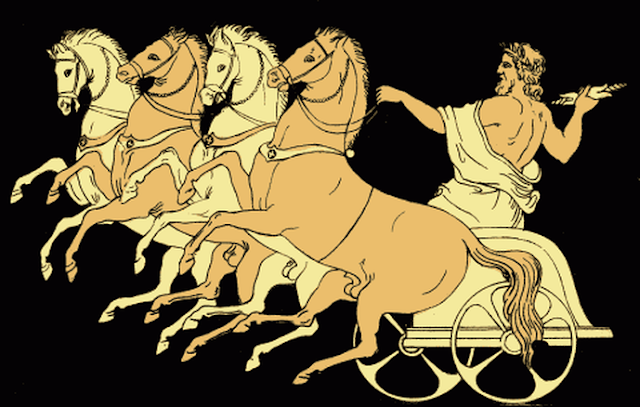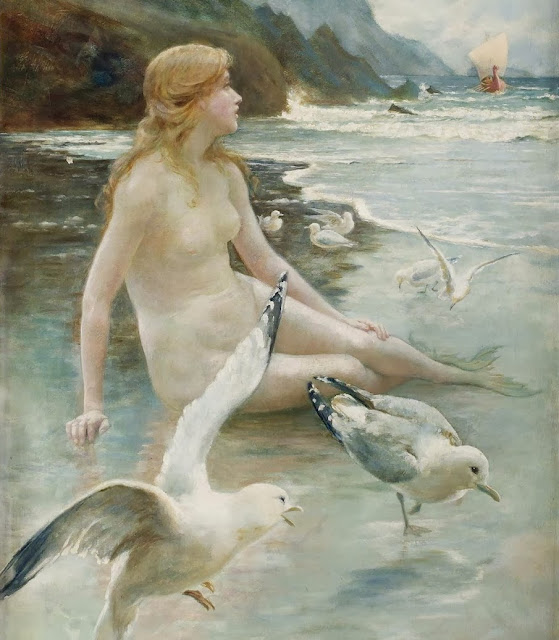SALMONEUS, a son, or grandson, of Aeolus and Enarete, reigned for time in Thessaly before leading an Aeolian colony to the eastern confines of Elis; where he built the city of Salmonia near the source of the river Enipeus, a tributary of the Alpheius. Salmoneus was hated by his subjects, and went so far in his royal insolence as to transfer Zeus’s sacrifices to his own altars, and announce that he was Zeus. He even drove through the streets of Salmonia, dragging brazen cauldrons, bound with hide, behind his chariot to simulate Zeus’s thunder, and hurling oaken torches into the air; some of these, as they fell, scorched his unfortunate subjects, who were expected to mistake them for lightning. One fine day Zeus punished Salmoneus by hurling a real thunderbolt, which not only destroyed him, chariot and all, but burned down the entire city.
b. Alcidice, Salmoneus’s wife, had died many years before, in giving birth to a beautiful daughter named Tyro. Tyro was under the charge of her stepmother Sidero, and treated with great cruelty as the cause of the family’s expulsion from Thessaly; having killed the two sons she bore to her evil uncle Sisyphus. She now fell in love with the river Enipeus, and haunted its banks day after day, weeping for loneliness. But the River-god, although amused and even flattered by her passion, would not show her the least encouragement.
c. Poseidon decided to take advantage of this ridiculous situation. Disguising himself as the River-god, he invited Tyro to join him at the confluence of the Enipeus and the Alpheius; and there threw her into a magic sleep, while a dark wave rose up like a mountain and cured in crest to screen his knavery. When Tyro awoke, and found herself ravished, she was aghast at the deception; but Poseidon laughed as he told her to be off home and keep quiet about what had happened. Her reward, he said, would be fine twins, sons of a better father than a mere river-god.
d. Tyro contrived to keep her secret until she bore the promised twins, but then, unable to face Sidero’s anger, exposed them on a mountain. A passing horse-herd took them home with him, but not before his brood-mare had kicked the elder in the face. The horse-herd’s wife reared the boys, giving the bruised one to the mare for suckling and calling him Pelias; the other, whom she called Neleus, took his savage nature from the bitch which served as his foster-mother. But some say that the twins were found floating down the Enipeus in a wooden ark. As soon as Pelias and Neleus discovered their mother’s name and learned how unkindly she had been treated, they set out to avenge her. Sidero took refuge in the temple of Hera; but Pelias struck her down as she clung to the horns of the altar. This was many insults that he offered the goddess.
e. Tyro later married her uncle Cretheus, founder of Iolcus, whom she bore Aeson, father of Jason the Argonaut; he also regarded Pelias and Neleus as his sons.
f. After Cretheus’s death, the twins came to blows: Pelias took the throne of Iolcus, exiled Neleus, and kept Aeson as a prisoner in his palace. Neleus led Cretheus’s grandsons Melampus and Bias with company of Achaeans, Phthiotians, and Aeolians to the land of Messene, where he drove the Lelegans out of Pylus, and raised to such a height of fame that he is now acclaimed as its founder. He married Chloris; but all their twelve children, except Nestor have been eventually killed by Heracles.
1. Antigonus of Carystus (Account of Marvellous Things) recounts that a rain-bringing bronze wagon was kept at Crannon: whirl of drought the people drove over rough ground to shake it and give sound-and also (as Crannonian coins show) to splash about the water from the jars which it contained. Rain always came, according to Antigonus. Thus Salmoneus’s charm for inducing thunderstorms have been common religious practice: like rattling pebbles in a dry jar, tapping on oak doors, rolling stones about in a chest, dancing, shields, or swinging bull-roarers. He was pictured as a criminal or the impersonation of Zeus had been forbidden by the Achaean authority. To judge from the Danaids’ sieves and the Argive cow dance, rain-making was originally female prerogative-as it remains among certain primitive African tribes-the Hereros and the Damaras-but passed into the sacred king when the Queen permitted him to act as her deputy.
2. Tyro was the Goddess-mother of the Tyrians and Tyrrhenians, or Tyrsenians, and perhaps also of the Tirynthians; hers is probably a pre-Hellenic name, but supplied Greek with the word tyrsis (‘walled city’), and so with the concept of ‘tyranny’. Her ill-treatment by Sidero recalls that of Antiope by Dirce, a myth which it closely resembles; and may originally have recorded an oppression of the Tyrians by their neighbours, the Sidonians. River water was held to impregnate brides who bathed in it-bathing was also a purifying ritual after menstruation, or child-birth-and it is likely that Tyro’s Enipeus, like the Scamander, was invoked to take away virginity. The anecdote of Tyro’s seduction by Poseidon purports to explain why Salmoneus’s descendants were sometimes called ‘Sons of Enipeus’, which was their original home, and sometimes ‘Sons of Poseidon’, because of their naval fame. Her previous seduction by Sisyphus suggests that the Corinthian Sun cult had been planted at Salmonia; Antiope was also connected by marriage with Sisyphus.
3. Tyro’s ark, in which she sent the twins floating down the Enipeus, will have been of alder-wood, like that in which Rhea Silvia sent Romulus and Remus floating down the Tiber. The quarrel of Pelias and Neleus, with that of Eteocles and Polyneices, Acrisius and Proetus, Atreus and Thyestes, and similar pairs of kings, seems to record the breakdown of the system by which king and tanist ruled alternately for forty-nine or fifty months in the same kingdom.
4. The horns of the altar to which Sidero clung were those habitually fixed to the cult- image of the Cow-goddess Hera, Astarte, Io, Isis, or Hathor; and Pelias seems to have been an Achaean conqueror who forcibly reorganized the Aeolian Goddess cult of Southern Thessaly. In Palestine horned altars, like that to which Joab clung (Kings.), survived the dethronement of the Moon-cow and her golden Calf.
b. Alcidice, Salmoneus’s wife, had died many years before, in giving birth to a beautiful daughter named Tyro. Tyro was under the charge of her stepmother Sidero, and treated with great cruelty as the cause of the family’s expulsion from Thessaly; having killed the two sons she bore to her evil uncle Sisyphus. She now fell in love with the river Enipeus, and haunted its banks day after day, weeping for loneliness. But the River-god, although amused and even flattered by her passion, would not show her the least encouragement.
d. Tyro contrived to keep her secret until she bore the promised twins, but then, unable to face Sidero’s anger, exposed them on a mountain. A passing horse-herd took them home with him, but not before his brood-mare had kicked the elder in the face. The horse-herd’s wife reared the boys, giving the bruised one to the mare for suckling and calling him Pelias; the other, whom she called Neleus, took his savage nature from the bitch which served as his foster-mother. But some say that the twins were found floating down the Enipeus in a wooden ark. As soon as Pelias and Neleus discovered their mother’s name and learned how unkindly she had been treated, they set out to avenge her. Sidero took refuge in the temple of Hera; but Pelias struck her down as she clung to the horns of the altar. This was many insults that he offered the goddess.
e. Tyro later married her uncle Cretheus, founder of Iolcus, whom she bore Aeson, father of Jason the Argonaut; he also regarded Pelias and Neleus as his sons.
f. After Cretheus’s death, the twins came to blows: Pelias took the throne of Iolcus, exiled Neleus, and kept Aeson as a prisoner in his palace. Neleus led Cretheus’s grandsons Melampus and Bias with company of Achaeans, Phthiotians, and Aeolians to the land of Messene, where he drove the Lelegans out of Pylus, and raised to such a height of fame that he is now acclaimed as its founder. He married Chloris; but all their twelve children, except Nestor have been eventually killed by Heracles.
2. Tyro was the Goddess-mother of the Tyrians and Tyrrhenians, or Tyrsenians, and perhaps also of the Tirynthians; hers is probably a pre-Hellenic name, but supplied Greek with the word tyrsis (‘walled city’), and so with the concept of ‘tyranny’. Her ill-treatment by Sidero recalls that of Antiope by Dirce, a myth which it closely resembles; and may originally have recorded an oppression of the Tyrians by their neighbours, the Sidonians. River water was held to impregnate brides who bathed in it-bathing was also a purifying ritual after menstruation, or child-birth-and it is likely that Tyro’s Enipeus, like the Scamander, was invoked to take away virginity. The anecdote of Tyro’s seduction by Poseidon purports to explain why Salmoneus’s descendants were sometimes called ‘Sons of Enipeus’, which was their original home, and sometimes ‘Sons of Poseidon’, because of their naval fame. Her previous seduction by Sisyphus suggests that the Corinthian Sun cult had been planted at Salmonia; Antiope was also connected by marriage with Sisyphus.
3. Tyro’s ark, in which she sent the twins floating down the Enipeus, will have been of alder-wood, like that in which Rhea Silvia sent Romulus and Remus floating down the Tiber. The quarrel of Pelias and Neleus, with that of Eteocles and Polyneices, Acrisius and Proetus, Atreus and Thyestes, and similar pairs of kings, seems to record the breakdown of the system by which king and tanist ruled alternately for forty-nine or fifty months in the same kingdom.
4. The horns of the altar to which Sidero clung were those habitually fixed to the cult- image of the Cow-goddess Hera, Astarte, Io, Isis, or Hathor; and Pelias seems to have been an Achaean conqueror who forcibly reorganized the Aeolian Goddess cult of Southern Thessaly. In Palestine horned altars, like that to which Joab clung (Kings.), survived the dethronement of the Moon-cow and her golden Calf.


Comments
Post a Comment